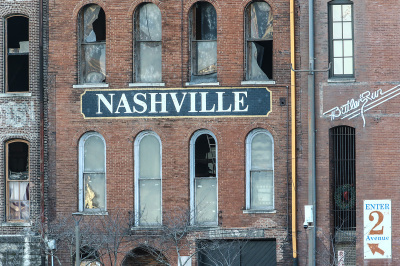FBI suspects 5G conspiracy motivated Nashville Christmas Day bomber

Nashville bomber Anthony Quinn Warner may have been motivated to bomb a downtown AT&T store on Christmas because of 5G conspiracy theories, a source involved with the FBI said.
An anonymous source close to the investigation told WSMV News that FBI agents are now investigating whether Warner believed in 5G conspiracy theories.
The source said investigators suspect Warner believed 5G was responsible for all deaths in the Nashville region and that he would be hailed as a hero after his death.
Nashville realtor Steve Fridrich confirmed some of the claims of the anonymous source. He said that FBI agents asked him if Warner had ever told him about paranoia over 5G technology. Fridrich employed Warner for several years as an information technology subcontractor.
“Nice guy. You know, he was a techie guy — don't mean anything negative about that. He would do this thing and leave. He didn't bother anybody. He did his thing and leave,” Fridrich said to WSMV.
Wireless network technologies, including 3G, 4G and 5G, send radio signals so computers, phones and other devices can connect to the internet. As the newest network technology, 5G can use a wider range of radio signals to send information. This ability makes the network faster and more efficient.
Many online conspiracy theories that gained popularity during the pandemic claim that 5G endangers people around the world. Some claim 5G causes COVID-19, will control people's minds through microchips or is a tool to spy on people.
There have been instances of conspiracy theorists destroying cell phone towers or attacking 5G installers to prevent the installation of 5G technology.
Investigators identified the 63-year-old Warner as the suspect behind the bombing that left three injured and dozens of businesses destroyed. The RV that exploded was parked outside an AT&T building.
Warner died in the explosion.
On the morning of the bombing, gunshots or recordings of gunshots were used to attract attention to his RV. Before the blast, the RV blasted speaker audio telling people to leave the area along with snippets of music. A security recording of the blast obtained by news site TMZ records a digital female voice giving warnings.
“If you can hear this message, evacuate now,” the voice said.
The RV also broadcasted music, including selections from Petula Clark’s song ‘Downtown.’
Its lyrics include the phrases, “When you're alone and life is making you lonely/ you can always go downtown” and “So go downtown/ Where all the lights are bright, downtown.”
Warner was unmarried and his neighbors knew little of him. Weeks before his suicide bombing, he started giving away his possessions, told a client he was retiring and told his ex-girlfriend he had cancer. His family was Catholic.
Experts believe he planned and premeditated the attack.
“Here’s what’s spectacularly odd: This might be the most successful attack on our telecommunications infrastructure ever, and it wasn’t by a terrorist group. In fact, it’s not clear that the AT&T building was deliberately targeted,” wrote Jim Geraghty of National Review.
The largest previous attack on U.S. infrastructure happened in April 2013, when unknown persons cut telephone wires and used sniper rifles to destroy power transformers in San José, California. Its perpetrators were never caught.
The attack destroyed several important parts of Nashville’s infrastructure. It affected cell phone service, hospital service and police systems over a wide area. All of Tennessee and some parts of Kentucky and Alabama experienced disruptions.
"I think this is a wake-up call and a warning for all of us about how vulnerable our infrastructure is, how relatively easy it is for a single individual to do this," Frank Figliuzzi said on CBS.
"Now, we've concentrated post-9/11 on getting our hands around all the chemical companies' mass orders of precursors for known explosives, and look what an individual can do on his or her own when they simply amass quantities of things that are under the radar screen," he said.
Figliuzzi said there may be a danger of copycat attacks in the upcoming weeks.





















